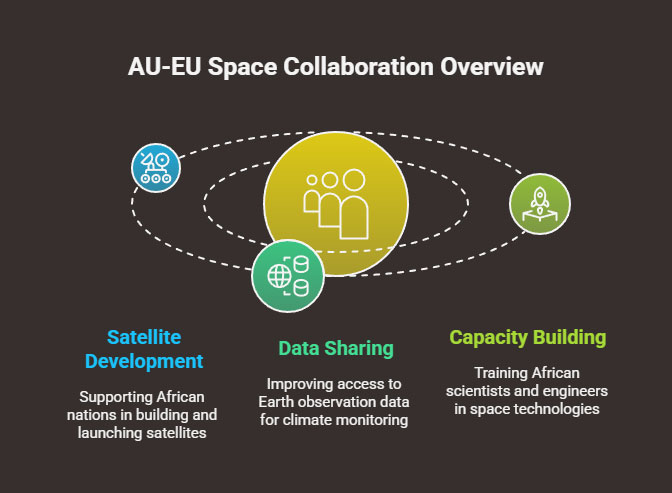Introduction
What’s the direction of the AU-EU partnership? The African Union (AU) and the European Union (EU) have taken a monumental step forward in space collaboration with the launch of the Africa–EU Space Partnership Programme. Announced during the 2025 NewSpace Africa Conference in Cairo, this initiative is a flagship component of the EU’s Global Gateway Africa–Europe Investment Package. It aims to advance African space technology, enhance satellite capabilities, improve data sharing, and foster innovation across the continent [1.3,4].
With Africa’s space sector rapidly growing, this partnership-backed by a €100 million EU investment and running from 2025 to 2028-could be a game-changer, providing the necessary infrastructure, funding, and expertise to propel African nations into the global space economy [2,3,5].
Overview
Why This Partnership Matters
Strengthening Africa’s Space Capabilities

The AU-EU collaboration focuses on:
-
Satellite development: Supporting African nations in building and launching their satellites, with technical expertise provided by European partners [2,3,5].
-
Data sharing: Improving access to Earth observation data for climate monitoring and disaster management, leveraging European assets like Copernicus, Galileo, and EGNOS [2,4,5].
-
Capacity building: Training African scientists and engineers in cutting-edge space technologies through institutional and technical partnerships [3,5].
Economic and Environmental Benefits
This partnership is designed to deliver tangible benefits for Africa:
-
Boosting local economies through job creation in the tech and aerospace sectors [2,3].
-
Enhancing food security by using satellite data for precision agriculture and resource management [2,5].
-
Improving disaster response with real-time monitoring of floods, droughts, and wildfires, and supporting early warning systems [2,4,5]..
Key Focus Areas of the AU-EU Space Partnership
1. Satellite Technology & Infrastructure
The EU will provide technical expertise and funding to help African nations develop their satellite programs, reducing reliance on foreign data sources and building indigenous capabilities [2,3,5].
2. Earth Observation for Sustainable Development
Satellite imagery and data will be used to:
-
Track climate change impacts and environmental changes [2,4,5].
-
Monitor deforestation, land use, and urban expansion.
-
Support maritime security and fisheries management, contributing to sustainable development goals [2,5].
3. Research & Innovation Hubs
Joint research initiatives will be established to foster innovation, with a focus on:
-
Startup incubation and private sector engagement for African space-tech entrepreneurs [2,3].
-
Structured AU-EU matchmaking for institutions, innovation ecosystems, and space marketplaces [3].
Programme Structure and Implementing Partners
The Africa–EU Space Partnership Programme is structured as a four-year initiative (2025–2028), with the first phase valued at €45 million [3,5]. A consortium of key partners implements it:
-
African Union Commission (AUC)
-
African Space Agency (AfSA), was officially inaugurated during the 2025 NewSpace Africa Conference [3,5,6]
-
European Space Agency (ESA)
-
Agence pour la sécurité de la navigation aérienne en Afrique et à Madagascar (ASECNA)
-
European Organisation for the Exploitation of Meteorological Satellites (EUMETSAT)
-
European Centre for Medium-Range Weather Forecasts (ECMWF) [3,5]
The programme builds on previous collaborations (such as GMES & Africa) and expands the scope to include navigation, communication, space science, and stronger engagement with the private sector and startups [3,5].
Challenges & Opportunities
Challenges
-
Funding constraints for long-term projects and ensuring sustained investment beyond the initial programme period [2,3].
-
Need for stronger policy frameworks across African nations to harmonize space sector development [2,3].
-
Ensuring equitable access to space technology and data for all AU member states [3,5].
Opportunities
-
Positioning Africa as a key player in the global space industry, strengthening its space economy and technological sovereignty [3,4].
-
Attracting private investment and supporting the growth of space startups and innovation ecosystems [2,3].
-
Leveraging space data for smarter policymaking in areas like agriculture, disaster risk reduction, and climate resilience [2,4,5].
Conclusion
The AU-EU Space Partnership marks a pivotal moment for Africa’s technological advancement. By combining resources, funding, and expertise, this collaboration has the potential to unlock new opportunities in agriculture, climate resilience, and economic growth [1,3,4]. As Africa continues to expand its presence in space, this partnership-anchored in the EU’s Global Gateway strategy and implemented by leading African and European agencies-could be the catalyst needed to propel the continent into a new era of innovation and self-sufficiency [3,4,5].
Stay tuned for more updates on how this groundbreaking initiative unfolds!
References:
1 African Union Commission – EU Launch Space Partnership Programme
2 Developing Telecoms – Africa-EU Space Partnership Programme announced
3 African Space Agency – Africa–EU Space Partnership Launched
4 European Commission – Global Gateway: EU reinforces partnership with Africa
5 European Commission – Africa–EU Space Partnership programme
6 African Space Agency – African Space Agency to be Inaugurated in 2025
—
This article is optimized for SEO with relevant keywords such as AU-EU space partnership, African space technology, satellite development, and Earth observation. By structuring the content with headers, bullet points, and bolded key terms, it enhances readability and search engine visibility.


